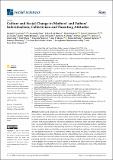Culture and Social Change in Mothers’ and Fathers’ Individualism, Collectivism and Parenting Attitudes
Publication Date
2021Author
Jennifer E. Lansford , Susannah Zietz , Suha M. Al-Hassan , Dario Bacchini , Marc , Lei Chang , Kirby Deater-Deckard , Laura Di Giunta , Kenneth A. Dodge , Sevtap Gurdal , Qin Liu , Qian Long , Paul Oburu , Concetta Pastorelli , Ann T. Skinner , Emma Sorbring , Sombat Tapanya , Laurence Steinberg , Liliana Maria Uribe Tirado , Saengduean Yotanyamaneewong and Liane Peña Alampay
Metadata
Show full item recordAbstract/
Cultures and families are not static over time but evolve in response to social transformations, such as changing gender roles, urbanization, globalization, and technology uptake. Historically,
individualism and collectivism have been widely used heuristics guiding cross-cultural comparisons,
yet these orientations may evolve over time, and individuals within cultures and cultures themselves
can have both individualist and collectivist orientations. Historical shifts in parents’ attitudes also
have occurred within families in several cultures. As a way of understanding mothers’ and fathers’
individualism, collectivism, and parenting attitudes at this point in history, we examined parents
in nine countries that varied widely in country-level individualism rankings. Data included mothers’ and fathers’ reports (N = 1338 families) at three time points in China, Colombia, Italy, Jordan,
Kenya, Philippines, Sweden, Thailand, and the United States. More variance was accounted for by
within-culture than between-culture factors for parents’ individualism, collectivism, progressive
parenting attitudes, and authoritarian parenting attitudes, which were predicted by a range of sociodemographic factors that were largely similar for mothers and fathers and across cultural groups.
Social changes from the 20th to the 21st century may have contributed to some of the similarities
between mothers and fathers and across the nine countries.
Collections
- Department of Psychology [216]

